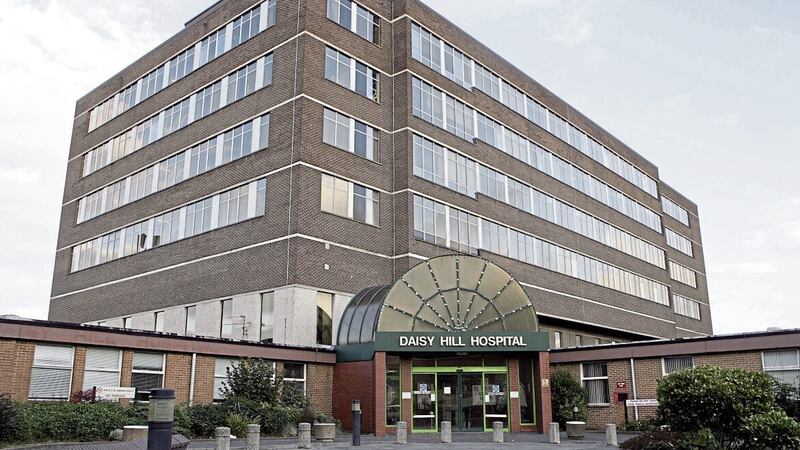The moment of truth is arriving for Daisy Hill Hospital. Nine consultants have left in the last six months, acute stroke services stopped this week as the only specialist is leaving, and further consultants’ contracts are due to expire.
As staff shortages worsen in any organisation, a tipping point is reached where the increased workload drives everyone else away.
The people of south Down and south Armagh have been badly led over health reform, both in the failure to implement it and by being told major reforms might be avoided. There are now claims an all-Ireland health service is the answer, as if that would not also mean rationalising services and travelling further for care.
Daisy Hill can have a future as an important surgical hub, but only by accepting there is no future for small general hospitals, anywhere.
**
Joint authority would spark “major unrest and trouble”, DUP peer Nigel Dodds has said, replying to comments from former Alliance leader Lord Alderdice, which Dodds branded “grossly irresponsible”.
Misplaced warnings can also be irresponsible, of course. The responsible observation is that joint authority was attempted by the 1985 Anglo-Irish Agreement, to exactly the extent Lord Alderdice suggested. Unionists did react with major unrest but this fizzled out, and appeared absurd in retrospect, as it became clear the agreement’s institutions were an irrelevance.
Those institutions still exist, subsumed into strand three of the Good Friday Agreement, where they remain irrelevant. So in the end, unionists quietly accepted everything they had rioted over, while nationalists quietly accepted that an ‘enhanced consultative role for Dublin’ is a bucket of wind.
**
Changing the rules for a border poll is a conversation mainly taking place within nationalism – unionists prefer to avoid the subject altogether.
So it says something about Ian Paisley’s need for attention that he keeps jumping in with both feet. The DUP MP has called for minimum turnout and super-majority requirements in all constitutional referendums – audacious from a Brexiteer.
Although there is no chance of this happening, nationalists might still want to give Paisley a measured response, as deriding him for arguments nationalist leaders have made could be exactly the attention he wants.
The Good Friday Agreement clearly precludes a super-majority. It might allow a minimum turnout but this would have to be low enough to prevent unionists invalidating the result with a boycott – a well-recognised issue with turnout thresholds. Logically and ironically, that points to 50 per cent.
**
Arlene Foster has suggested the DUP could enter coalition with the next Labour government. The idea has been roundly dismissed: “not happening”, the Labour Party Irish Society responded.
Although such an outcome is statistically unlikely, it is not politically preposterous. Labour leader Sir Keir Starmer has not ruled it out, despite ruling out coalition with the SNP. By contrast, Prime Minister Rishi Sunak has ruled out coalition with the DUP.
After the 2010 general election, as Gordon Brown desperately tried to cling on in Number 10, he begged the DUP for a confidence and supply deal in return for more Stormont funding – an episode Labour has since consigned to the memory hole.
**
Stormont and Belfast City Council split the £5.2 million cost of the new Lagan Gateway footbridge, weir and lock, designed to connect up the city’s greenways.
It opened just in time for a private developer to start blocking one end with a luxury housing development.
Last November, the council’s planning committee approved the 18 houses on condition the developer provides a “public pathway”. Yet the council’s latest consultation document, published this week, merely says “the plans associated with this private scheme suggest a connection will be provided”.
What this suggests is that planning conditions in Belfast are meaningless.
**
The PSNI may have to decommission a helicopter due to budget constraints, the Police Federation has warned.
This would be bad news for affected staff but would it be a bad idea? The PSNI has three helicopters and one fixed-wing aircraft. The helicopters are 18, 13 and 10 years old, so all predate the pervasiveness of drones.
Although police forces insist drones cannot completely replace helicopters, partial replacement has already occurred around the world. In 2019, Dorset police were the first to do this in the UK, reporting significant savings. The Home Office began evaluating large drones the following year to replace police helicopters across Britain.
**
Sinn Féin MLA Declan Kearney is seeking an “urgent meeting” with senior officials at the Department for Infrastructure after a court ruled the Hightown incinerator can go ahead.
“Local residents can be reassured that Sinn Féin will continue to stand four-square behind the community in their opposition,” he said.
Residents might note, and officials might point out, that the incinerator would have been approved in Belfast’s Duncrue industrial estate 15 years ago had Sinn Féin not scuppered a multi-council agreement at the last minute. The party was opposing the Poolbeg incinerator in Dublin so decided this had to be an all-Ireland policy. Yet NI Water somehow managed to build a huge sewage incinerator in Duncrue at the same time, while answerable to Sinn Féin minister Conor Murphy.
Poolbeg opened in 2017.









